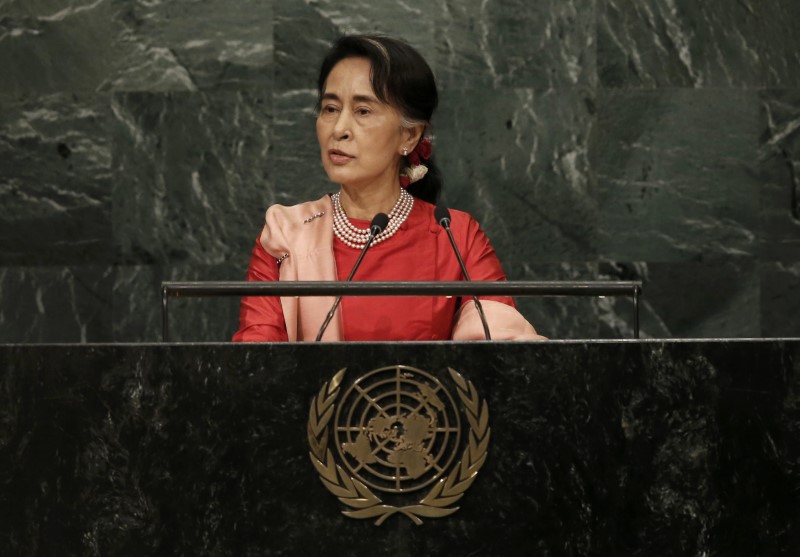By David Brunnstrom
UNITED NATIONS (Reuters) - In her first address to the U.N. General Assembly as national leader, Myanmar's former political prisoner and Nobel Peace Prize winner Aung San Suu Kyi defended her government's efforts to resolve a crisis over treatment of the country's Muslim minority.
Suu Kyi, who has been criticized for doing too little to address the plight of the Rohingya Muslims in Myanmar's Rakhine State, said the government did not fear international scrutiny, but asked "for the understanding and the constructive contribution of the international community."
"We are committed to a sustainable solution that will lead to peace, stability and development for all communities within the State," she said.
"Our government is taking a holistic approach that makes development central to both short- and long-term programs aimed at promoting understanding and trust."
Suu Kyi pointed to the establishment of an advisory commission for Rakhine State chaired by former United Nations Secretary General Kofi Annan, with a mandate covering basic rights and security issues.
Suu Kyi said there had been "persistent opposition from some quarters" to the establishment of the commission. She said the government would persevere in its efforts to achieve peace in Rakhine.
"By standing firm against the forces of prejudice and intolerance, we are reaffirming our faith in fundamental human rights, in the dignity and worth of the human person."
Increased freedom of speech since the military stepped back from direct rule in 2011 has allowed for the unleashing of long-held anti-Muslim sentiment in Myanmar. More than 100 people were killed and some neighborhoods were razed to the ground in 2012 when ethnic Rakhine Buddhists clashed with Rohingya Muslims.
Some 125,000 people are still displaced, the vast majority of them Rohingya, who are prevented from moving freely.
The Rohingya have long been persecuted, being seen by much of the majority Buddhist population as illegal immigrants from Bangladesh, even though many have lived in the country for generations. Most were stripped of their ability to vote in last year’s election, which brought Suu Kyi to power as de facto leader.

In Washington last Thursday, Suu Kyi urged businesses to invest in Myanmar as a way to advance its democratic transition, a day after U.S. President Barack Obama pledged to lift long-standing sanctions on the country.